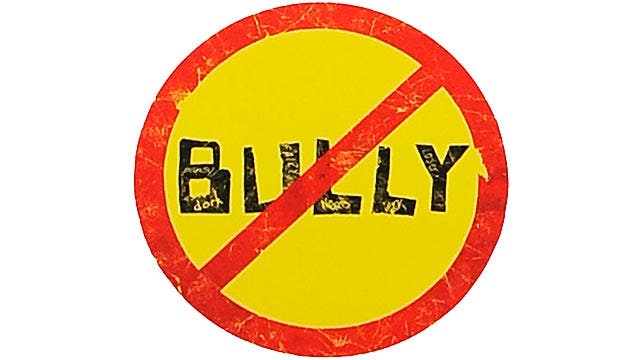How to protect your kids from cyberbullying
Penny Nance on how parents can prevent teenagers from feeling threatened via the Internet
If you're the parent of a teen, you have witnessed this scenario at your own kitchen table, I’m sure. Less talking. More texting. Virtual conversations, whether via smart phones or social media, consume our kids’ existence.
Our children’s social lives are no longer played out at home and at school, where adults are present, but now inhabit dark corners of the Internet. As parents, we want to believe these are harmless digital exchanges with their school friends — but what if they’re not?
Over 88 percent of teenagers say they have seen someone be "mean" and "cruel" to another person on a social network site according to the Pew Research Center. The most common form of cyberbullying is wide distribution of intimate information to the public.
Having private text messages forwarded without consent or having an embarrassing picture posted on Facebook without permission can lead to a tidal wave of emotional and verbal abuse. Now anyone and everyone can provoke a cyber attack without fear of consequences, or so it would seem.
[pullquote]
- Family of California teen who committed suicide after sex assault plans legal action against suspects
- Calif. sheriff’s office: 3 teens arrested in sexual battery of girl who later killed herself
- Calif. school couldn’t expel teens accused in assault case, official says
- Assaulted California teen had drawings, suspects’ names on body, lawyer says
But the consequences are very real. According to the Cyberbulling Research Center, virtual attacks result in teenage depression, low self-esteem — and worse — suicide.
Take the beautiful 15-year-old teenage girl from California, Audrie Pott, who police say was raped while unconscious at a party.
Tragically, Audrie hanged herself eight days after her attackers posted humiliating photos of her on social media. Right before committing suicide, Audrie posted on Facebook, “My life is ruined. ... The whole school knows. ... My life is over. ...” Three 16-year-old boys have been arrested and are being prosecuted in a wrongful death suit, which basically aims to prove that the evil actions of these three teenage boys led to the death of Audrie Pott.
In the wake of Audrie’s case, Canadian police have reopened the case of Rehtaeh Parsons, another teen girl who committed suicide after photos of her alleged sexual assault went viral
And, of course, we cannot forget about the brave rape victim in Stuebenville, Ohio, who is currently seeking justice not just against her convicted rapist but also against the high school football players who filmed the attack and bragged about it by spreading the footage throughout the Web.
Hopefully, Ohio Attorney General Mike DeWine’s investigation of both kids and adults involved will culminate in other much-deserved convictions.
But here’s my question: If social media is known as a tremendous problem among our teens, then what are adults going to do to protect them?
Twitter has done a good job providing a “Safety Tips for Parents” page that aims to educate parents on parental blocks. Other researchers are working on apps and algorithms to detect and report bullying online. But these efforts cannot go far enough.
Think about it. Parents are legally responsible for their children until they reach adulthood.
Therefore, shouldn’t they be expected to know what’s going on with their own kids in cyberspace? While you cannot always read over your kids’ shoulders, you can keep the lines of communication open.
A wise teacher named Erin Kurt asked her students the same questions every year for over 16 years, and from these responses she learned, “The Top 10 Things Kids Want from Parents.” At the top of the list, most kids just want their parents to sit and talk with them privately. When was the last time you sat down face to face with your child and asked them, “What is going on in your life, and are you all right?”
Beyond open discussions, watch for signs of changed behavior. A teenager’s body language, words, changes in eating and sleep habits, and a drastic drop in grades can all be indications that your child is facing bullying. Silence often makes a powerful statement.
If your child is being cyberbullied, get the passwords and usernames of their social media and e-mail accounts.
Block users who are harassing your child. If threats persist, screenshot hateful posts and pictures and reach out to other parents, schools, and eventually law enforcement.
Above all, validate their feelings and respect their struggles, no matter how seemingly harmless.
Take a moment to remember how hard it is to be a kid, and then multiply that by about a thousand. We have no idea what they are really up against in today’s culture.
These tactics might seem extreme, but it is our duty as moms and dads to protect our children — sometimes even from themselves.
I tell my 16-year-old daughter all the time that social media is not a right; it’s a privilege. After all, my husband and I pay the cell phone bill and own the laptops. And as parents, we love our children unconditionally, and we want to save them from immense suffering.
We are the first line of defense, not the school, not the government.
Finally, pray for your kids every day. As much as we love them, God loves them more. I routinely pray for His protection and also, oddly, for me to catch them if they mess up, so we can correct them and set them immediately on the right path.
Go on. Be a mean mom or dad, and find out what your kids are doing online or on their phones. It just might save your child’s life.

